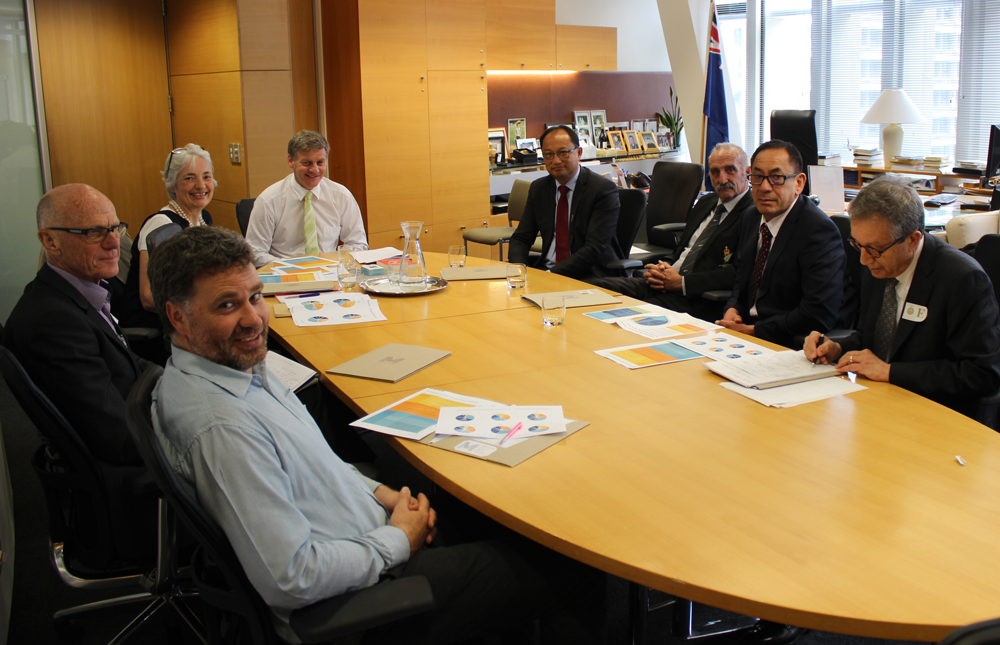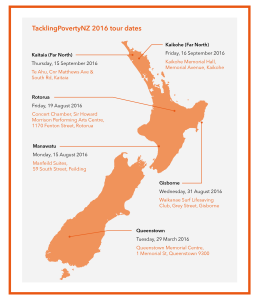As part of the TacklingPovertyNZ project, the Institute organised a meeting with the mayors from the 2016 one-day workshops and
Deputy Prime Minister Hon Bill English on Thursday, 3 November 2016. The purpose of the meeting was to share with the Minister observations from work with local authorities and communities from March to September 2016 and to further build and share ideas on how to tackle poverty within regional communities. The meeting presented an opportunity for the mayors of the one-day workshop regions to share with the Minister their views on the issue and present their ways forward and also allowed the voices of the grassroots to be heard on a national stage.
Far North District Mayor Hon John Carter and Gisborne Mayor Meng Foon proposed their solutions to tackle poverty in their region, while Wendy McGuinness shared the voices of the mayors who could not attend the meeting (Queenstown Lakes District Mayor Jim Boult, Manawatu District Mayor Helen Worboys and Rotorua Lakes Mayor Hon Steve Chadwick could not attend due to prior commitments). Hon Bill English, Hon John Carter, Meng Foon and Wendy McGuinness were joined by Dr Girol Karacaoglu (Head of Victoria University of Wellington’s School of Government, previously Chief Economist, New Zealand Treasury), Dr Carwyn Jones (senior lecturer in the Faculty of Law, Victoria University of Wellington), Dame Diane Robertson (Chair, Data Futures Working Group), Ben Dalton (Deputy Director-General Sector Partnerships and Programmes, MPI) and a team from the Institute.

The meeting was a valuable way to present to government potential solutions to regional problems which had been developed by members of the community. It was an important tool that Mayor Hon John Carter and Mayor Meng Foon understood the machinery of government while also listening to people in their communities and respected by those communities. The Institute presented to the Minister a number of post-workshop outputs, including an infographic titled A situational view of the talking tour 2016/ He tuahua o te haerenga korero 2016 which analysed the ‘hows’ into ‘sub-factors’ and a checklist titled TacklingPovertyNZ 33 sub-factors defined. We are in the process of preparing a working paper which will included these, and other outputs. These outputs will also be publicly available on the publications page of the McGuinness Institute website.
We hope to see some developments from this meeting over the next few months. To keep up to date, or to see more information on the TacklingPovertyNZ project, head to the website – www.tacklingpovertynz.org.
The 2016 TacklingPovertyNZ tour was a collaboration of the McGuinness Institute, the New Zealand Treasury, Queenstown Lakes District Council, Manawatu District Council, Rotorua Lakes Council, Gisborne District Council and Far North Distric Council – thank you for your ongoing support. Thank you also to the participants of the one-day workshops – without your hard work, this would not have been possible.
Background
In 2015 we brought the youth voice to parliament through the finale presentation of the TacklingPovertyNZ workshop held from 7 to 9 December. The workshop saw 36 New Zealanders between the ages of 18 and 25 come together in Wellington to articulate a youth perspective on the issue of poverty in New Zealand and how we might, as a country, go about tackling it. At the end of a fast-paced 72 hours, the group presented their findings to MPs and other guests at Parliament on how New Zealand might best tackle poverty as a country. Participants had the floor for one hour, during which time they reported their observations, outlined key obstacles and set out potential opportunities going forward. A video of the finale can be viewed here. One of the observations made by participants at the 2015 TacklingPovertyNZ workshop was that poverty in New Zealand is too complex an issue to be overcome with a blanket solution. Instead, solutions must be developed and implemented at a local level to acknowledge that poverty has vastly differing consequences for people in different areas of New Zealand. The 2016 tour sought to explore this assumption.

